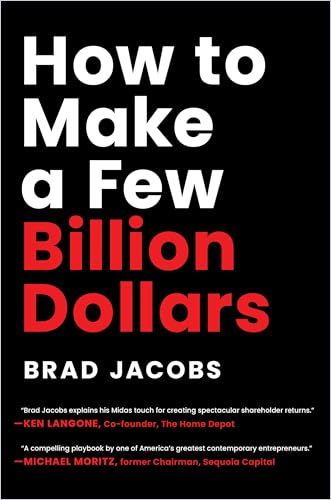Businessman Brad Jacobs, who built several companies into billion-dollar behemoths, details the straightforward tactics and positive mindset that enabled his success.

Do Your Research, Hire Well, Cut Your Losses.
American entrepreneur Brad Jacobs, founder of a number of billion-dollar companies, details the attitudes he credits for turning XPO, United Rentals, and United Waste Systems into stock market darlings.
Radical Acceptance
Brad Jacobs is an advocate of “radical acceptance,” which focuses on acknowledging reality in the present and being mindful, while forgetting about past mistakes and dispensing with dreams of future success. Jacobs learned the value of radical acceptance in the late 1990s, when he ran United Rentals. Optimistic about a major infrastructure bill, he acquired companies that rented out construction barricades, traffic cones, and related items. The road-building boom never materialized, and Jacobs’s mistake led to a $500 million loss. Radical acceptance dictated that he cut his losses and move on.
Automatic negative thoughts are a knee-jerk mental reaction to a situation that almost always can be reframed in a positive light.Brad Jacobs
Jacobs also believes in working to have a positive mindset, though he notes that even successful people can suffer from an internal soundtrack of negativity and criticism. If a negative interior monologue is holding you back, he encourages you to shoot it down. To establish a positive mindset, start with a specific change: When you discuss your day with family or friends, don’t mention setbacks or frustrations. Instead, describe the happiest moment of your day.
The author is also a proponent of cognitive behavioral therapy (CBT), which helps people challenge negative thoughts and recast them as optimistic ideas. Those who practice CBT learn to recognize “catastrophizing,” perfectionism, and all-or-nothing thinking as mere data points, not reality. When you tune out self-judgment and other unhelpful emotions, you can make sharper, more rational decisions.
Technological Innovation
Jacobs’s mentor told him, “You can mess up a lot of things in business, as long as you get the big trend right.” Today, the big trend is technology.
If you want to make money in almost any industry, plan to invest heavily in tech.
AI is evolving at breakneck speed. What’s possible changes every six months. Jacobs follows analyses from SoftBank CEO Masayoshi Son and tech execs such as Mario Harik, the CEO of XPO. He also uses AI tools, including ChatGPT and Bard, to help him analyze information and stay open-minded about trends he might overlook.
For example, Jacobs recently considered acquiring accounting firms, but he concluded that AI might replace accountants in the near future. With the advance of AI, he says, professionals – such as insurance brokers, attorneys, paralegals, journalists, and coders – could become redundant. Jacobs believes that industries rooted in the physical world – health care, manufacturing, construction – might weather the AI storm.
Artificial intelligence is emerging as the determining factor in whether businesses and entire industries will collapse or prosper.Brad Jacobs
In 1989, Jacobs learned that the US’s two most profitable waste management companies were making $500 million in annual profits. He made the judgment that he could find opportunities in that industry, particularly in consolidating landfills and rural garbage collection. Having reached that conclusion, Jacobs used his own funds and investments from friends and family to start United Waste Systems. Regulations were forcing old-school dumps to transform into new-school landfills, and small operators lacked the capital to upgrade. United Waste Systems acquired landfills in rural Mississippi and Michigan. Eight years later, Jacobs sold the company for $2.5 billion.
United Waste Systems demonstrates the upside of an aggressive acquisition strategy. Jacobs’s rule of thumb is to do a deal only if the worst-case scenario is still good for the acquirer and the best-case scenario would yield excellent returns. If a post-merger corporate combination doesn’t excite Jacobs’ most astute salespeople and most important customers, he won’t do it because, based on their feedback, he would conclude that the transaction wouldn’t create the requisite value.
In 2011, Jacobs acquired XPO, a transportation company, and saw it through a number of acquisitions and integrations in 2014 and 2015. Jacobs averaged 14-hour workdays negotiating transactions and managing the integrations.
Sometimes, a company’s competitors don’t welcome such aggressive strategies. When Jacobs’ company, United Rentals, experienced rapid growth, the CEO of Hertz took him to lunch and berated him for his unlimited expansion. Jacobs ignored the message.
Meetings, Hiring, and Workers
An effective meeting demands a spark, which most meetings lack. Often, they waste people’s time. Productive, exciting meetings should follow an agenda crowd-sourced from those involved and should include people who respectfully disagree with what they hear. Jacobs encourages dissent in meetings; he grows anxious if everyone agrees. He believes driven, intelligent people will interpret the same information differently, and that discussing their interpretations while brainstorming generates better results.
Even one hiring mistake can prove costly. When Jacobs was CEO of XPO, he personally interviewed every job candidate. He wanted to know how he felt in the candidate’s presence. If Jacobs felt calm and inspired during the interview, he knew he’d enjoy having that person at his company.
Don’t be cheap with what you pay for talent. Tie compensation to performance.Brad Jacobs
Other team members also weighed in on each applicant’s qualifications and personality. When hiring, Jacobs focuses on traits he sees as nonnegotiable: “intelligence, hunger, integrity, and congeniality.” He finds that people who are hungry work hard, take on challenges, and persevere. Jacobs sometimes must tell his hardest-working staffers to take time off.He demands collegiality and integrity. He doesn’t accept nasty behavior, and lying is an employment disqualification.
Jacobs knows that when an employee says he or she is leaving, if his initial emotion is relief, that employee was a C player. If Jacobs feels slight remorse, the employee was a B contributor. But if Jacobs’ reaction is that he cannot do without someone, that employee belongs on the A team.
Your C players most likely have performance issues, so Jacobs advises firing them kindly with a generous severance package. Motivate A and B players with compensation. For example, tie sales commissions to profitability and revenue growth. That gives salespeople an incentive to focus on top-line revenue and to consider what impact a new customer could have on the company.
Self-Made Success
Jacobs gives his advice and details his history in a voice that speaks directly to his readers. He outlines how common sense made him successful, and then presents his guidance as more common sense. His strategies include doing extensive research before entering a business, hiring the smartest people, and running exciting meetings. Sounds simple, doesn’t it? But Jacobs is not reductive. He spells out and shares the relatively simple tactics that he devised, prioritized and stuck to throughout his career — the strategies that made him a billionaire. His memoir offers an intriguing journey along the path of a successful self-made businessman.










